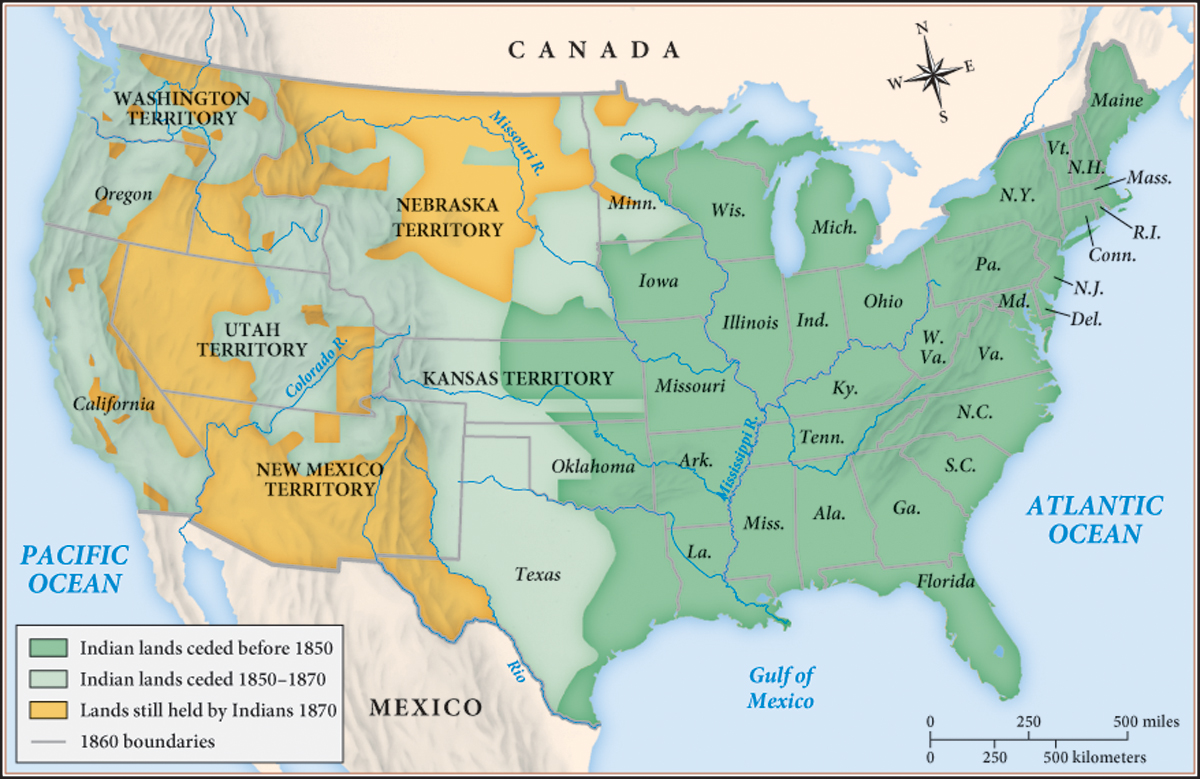Nation Building in North America
Nation Building in North America
Nation building in the United States involved unprecedented and destructive upheaval at midcentury. The young nation had a more democratic political culture than that of Europe, and nationalism was on the rise. Virtually universal white male suffrage, a rambunctiously independent press, and mass political parties promoted the belief that sovereignty derived from the people. From the beginning, a combative public politics shaped America.
The United States continued to expand westward (Map 22.4). In 1848, victory in the Mexican-American War almost doubled the size of the country: the United States officially annexed Texas, and large portions of California and the Southwest extended U.S. borders into formerly Mexican land. Politicians and citizens alike favored banning native Americans from these western lands and confining them to reservations. There was no agreement, however, on whether slavery would be allowed in the new western territories. The issue polarized the country. In the North, politicians in the new Republican Party ran on a platform of “free soil, free labor, free men.”

After Republican Abraham Lincoln (1809–1865) was elected president in 1860, most of the slaveholding states seceded to form the Confederate States of America. Civil war broke out in 1861 when, under Lincoln’s leadership, the North fought to preserve the Union. The future of nation building in the United States hung in the balance. Lincoln did not initially aim to abolish slavery, but his Emancipation Proclamation of January 1863 officially freed all slaves in the Confederacy and turned the war into a fight not only for union but also for an end to human bondage. After the summer of 1863, the North’s superior industrial strength and military might overpowered and physically destroyed much of the South. By April 1865, the North had prevailed, though a Confederate sympathizer assassinated Lincoln. Constitutional amendments ended slavery and promised full political rights to African American men.
By 1871, northern interest in promoting African American political rights was declining, and whites began regaining control of state politics in the South, often by organized violence and intimidation. The end of northern occupation of the South in 1877 was a setback in obtaining rights for blacks. Nonetheless, in ending slavery, the Union victory opened the way to stronger national government and to economic advancement no longer tied to the old Atlantic plantation system.
REVIEW QUESTION What role did warfare play in the various nineteenth-century nation-building efforts?
The North’s triumph had profound effects elsewhere in North America. The United States also threatened the annexation of Canada to punish Great Britain, whose dependence on cotton had led it to support the Confederacy. To prevent the loss of Britain’s largest territory, the British government allowed Canadians to form a united dominion—that is, a self-governing unit of the empire—in 1867. Dominion status answered Canadians’ appeal for home rule, weakened the cause of those opposing Britain’s control of Canada, and strengthened Canadian national unity.